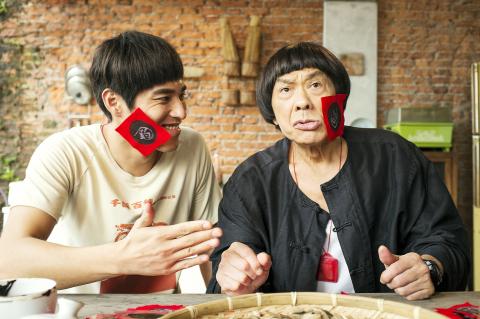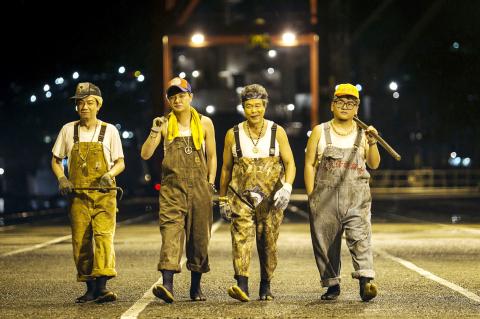If sappiness, melodramatics and exaggerated antics are staple features of Taiwanese commercial cinema, then 70-year-old Chu Ko Liang (豬哥亮) is its granddaddy. It seems just yesterday that Liang reemerged after keeping a low profile for more than a decade, but Hanky Panky (大釣哥) marks his sixth-straight Lunar New Year comedy — all massive box office successes. To be expected, the film is chock full of the aforementioned elements, and, of course, Liang’s trademark bathroom humor.
But the strange thing is that what would usually be cringe-worthy and outlandish makes total sense when Liang is in the mix. After all, he hails from a time where nonsensical comedies were still funny. All he has to do is be himself (or his usual stage persona) — the crass, inappropriate and over-the-top old man with the eternal bowl cut — and everything else seems to flow naturally. That said, Liang does rein in the weirdness for brief spurts and delivers a decent performance as a worried father whose son is about to be sentenced to death.
One might even complain that the film is tamer than expected, but Liang says he purposely created a more well-rounded character that is closer to his ideal of the “true Taiwanese man.” Liang says he has felt something missing in his previous films despite box office success, and decided to be more hands-on with Hanky Panky. Collaborating with former co-star Blue Lan (藍正龍), Liang reportedly spent three years coming up with the plot and setting before handing the reins to director Huang Chao-liang (黃朝亮), who directed Liang’s 2015 A Wonderful Wedding (大喜臨門).

Photo courtesy of Hualien Media
The result is nothing spectacular, and you’ll probably forget this movie once it’s over. But it isn’t a bad film for what it is: another solid and entertaining Liang-style comedy with a decent storyline and a surprising amount of chuckles, which is exactly what people are looking for in a holiday blockbuster. There’s even a somewhat clever twist at the end. But if you don’t understand Hoklo (also known as Taiwanese) or Mandarin, much of the humor will be lost in the subtitles. Even the Chinese film title is a pun, and god knows where they got “Hanky Panky” from.
There’s also a lot of pop culture-specific humor. For example, a scene where a female clerk at a sperm bank moves in slow motion will make no sense if you didn’t know that she is played by a guest actress whose claim to fame is imitating the DMV sloth clerk in Zootopia. What there isn’t in this movie, surprisingly, is swearing.
Liang plays Dadiao, a martial artist turned Chinese medicine practitioner who regularly commits petty theft with his son Hsiao-lung (Lan, also with a bowl cut). When Lan gets in trouble after borrowing money from his father’s enemy to send the love of his life (whom he just met) to law school, Liang must find a way to save him.

Photo courtesy of Hualien Media
Of course, the self-deprecating dirty old man gets no love in the film, and the romance falls to Hsiao-lung and Hsin-yi (Aggie Hsieh, 謝沛恩), who hold their own but lack Liang’s power of making the absurd seem normal. As a result, their scenes are mostly awkward and tacky.
Don’t dismiss Liang as a fool just because of his bumbling on-screen persona. There’s a reason he’s been able to stay relevant despite pulling the same old tricks decade after a decade. He knows how to tell a story, and most importantly, he knows how to make fun of himself — which is where most other Taiwanese screwball comedies fall short.

April 14 to April 20 In March 1947, Sising Katadrepan urged the government to drop the “high mountain people” (高山族) designation for Indigenous Taiwanese and refer to them as “Taiwan people” (台灣族). He considered the term derogatory, arguing that it made them sound like animals. The Taiwan Provincial Government agreed to stop using the term, stating that Indigenous Taiwanese suffered all sorts of discrimination and oppression under the Japanese and were forced to live in the mountains as outsiders to society. Now, under the new regime, they would be seen as equals, thus they should be henceforth

Last week, the the National Immigration Agency (NIA) told the legislature that more than 10,000 naturalized Taiwanese citizens from the People’s Republic of China (PRC) risked having their citizenship revoked if they failed to provide proof that they had renounced their Chinese household registration within the next three months. Renunciation is required under the Act Governing Relations Between the People of the Taiwan Area and the Mainland Area (臺灣地區與大陸地區人民關係條例), as amended in 2004, though it was only a legal requirement after 2000. Prior to that, it had been only an administrative requirement since the Nationality Act (國籍法) was established in

With over 80 works on display, this is Louise Bourgeois’ first solo show in Taiwan. Visitors are invited to traverse her world of love and hate, vengeance and acceptance, trauma and reconciliation. Dominating the entrance, the nine-foot-tall Crouching Spider (2003) greets visitors. The creature looms behind the glass facade, symbolic protector and gatekeeper to the intimate journey ahead. Bourgeois, best known for her giant spider sculptures, is one of the most influential artist of the twentieth century. Blending vulnerability and defiance through themes of sexuality, trauma and identity, her work reshaped the landscape of contemporary art with fearless honesty. “People are influenced by

The remains of this Japanese-era trail designed to protect the camphor industry make for a scenic day-hike, a fascinating overnight hike or a challenging multi-day adventure Maolin District (茂林) in Kaohsiung is well known for beautiful roadside scenery, waterfalls, the annual butterfly migration and indigenous culture. A lesser known but worthwhile destination here lies along the very top of the valley: the Liugui Security Path (六龜警備道). This relic of the Japanese era once isolated the Maolin valley from the outside world but now serves to draw tourists in. The path originally ran for about 50km, but not all of this trail is still easily walkable. The nicest section for a simple day hike is the heavily trafficked southern section above Maolin and Wanshan (萬山) villages. Remains of